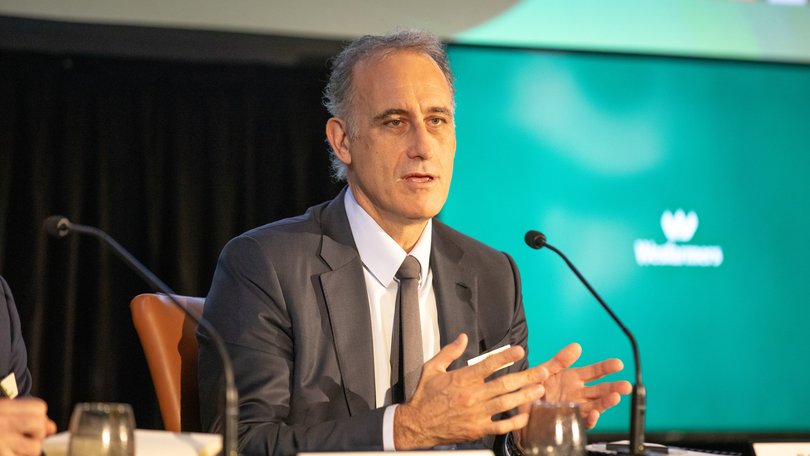Wesfarmers chief Rob Scott warns lower income households ‘still doing it tough’ despite rate relief
Wesfarmers boss Rob Scott says this week’s rate cut is welcome news but it will take time to seep into consumer spending, warning many low income workers are ‘still doing it tough’.

Wesfarmers boss Rob Scott says this week’s rate cut is welcome news but it will take time to seep into consumer spending, warning many low income workers are “still doing it tough”.
The head of Australia’s biggest conglomerate — which owns brands Kmart, Target, Bunnings and Officeworks — is seeing a continuation of consumer trends reported by the group earlier this year, with families and businesses still struggling under the weight of higher mortgages and loans.
“Many lower income households are still doing it tough, some (are) making deliberate choices to put fewer items in the basket,” Mr Scott told investors and analysts during the group’s strategy day on Thursday.
Sign up to The Nightly's newsletters.
Get the first look at the digital newspaper, curated daily stories and breaking headlines delivered to your inbox.
By continuing you agree to our Terms and Privacy Policy.“There are other customer cohorts, particularly those that would own their home without mortgage stress, that are continuing to spend and we see these trends across our retail businesses.”
Mr Scott said that while the Reserve Bank’s decision to lower the cash rate on Tuesday was a “welcome source of relief” for budget-crunched consumers and businesses, it would not be felt immediately.
The central bank lowered the official cash rate from 4.1 per cent to 3.85 per cent — the second cut this year following 13 rises since it began hiking rates in early 2022.
“The rate cut on Tuesday is a welcome source of relief for customers and this will ease pressure not only for households, but many businesses that are important customers of ours,” Mr Scott told the audience in Sydney.
“While this is positive, we know that it will take some time for this to flow through.”
Comparison site Canstar estimates Tuesday’s rate cut could save a family with a $600,000 home loan about $91 a month. The big four banks were quick to pass on the cut in full.
Perth-based Wesfarmers is among the nation’s retailers and businesses waiting to see whether Australians will splash the extra cash or stash the savings away.
It comes after Australia’s consumer sentiment recovered slightly in May as prospects of future interest rate cuts become more likely. But RBA governor Michele Bullock this week warned household spending was looking more cautious that it had been in the past.
The latest data from the Australian Bureau of Statistics on retail sales and household spending also pointed to some stagnation in the consumer sector.
Economist have previously warned the recovery in spending would be very gradual as households were still impacted by high prices.
But the RBA this week delivered good news on the cost-of-living crunch.
Core inflation — the central bank’s preferred measure because it strips out volatility — was forecast to remain within the 2 to 3 per cent target band for the next two years.
Core inflation hit 2.9 per cent for the 12 months to March, while headline inflation — the full picture of the impact on household budgets — was 2.4 per cent.
Commonwealth Bank senior economist Stephen Wu expects inflation to remain benign in the second quarter.
On the business environment, Mr Scott on Thursday said big and small firms were also still feeling the pressure from elevated costs and navigating a “more onerous and complex regulations”, particularly in the building sector.
He added companies like Wesfarmers were navigating “uncertain and volatile times” in terms of the cost of doing business.
Mr Scott pointed to Wesfarmers’ portfolio of brands like discount department store Kmart and hardware giant Bunnings, as well as increased investments in healthcare and lithium, which allowed the group to navigate the challenging economic environment.
“The group’s omnichannel assets and capabilities now provide a source of competitive advantage, with significant growth upside,” according to his presentation slides.

